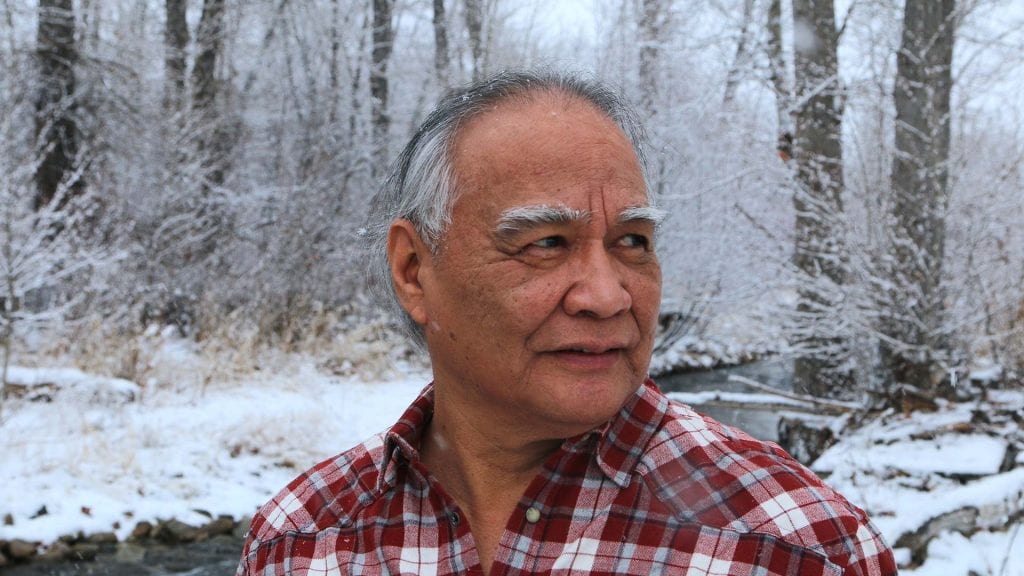
From a young age, Marlowe Sam was passionate about standing up for Indigenous rights.
“I left home when I was 16, it was either dropout or continue high school and go out into the world and do what I thought was right for our people,” says Sam.
The 69 year-old, who is a member of the Colville Confederated Tribes of Washington State, was one of the first two Indigenous people to get a Ph.D. from the University of British Columbia’s Okanagan campus (UBCO) in 2013.
“When I was doing my undergraduate, I got involved in a water research project. The program was just being developed, I guess I was kind of like the test student,” he says.
Now, he works as a lecturer at UBCO, where his work is focused on Indigenous water rights and customary laws.
On Jan. 26, Sam was one of the keynote speakers at a workshop designed “to bring together diverse stakeholders to discuss and improve understanding of Aboriginal water rights in British Columbia,” according to the event page.
The objective of the three-hour workshop was to raise awareness around the implications of Aboriginal title and rights as they relate to water in B.C., within the Syilx People’s unceded territory.
Sam was joined by Carrie Terbasket, a student at UBCO in Cultural Studies and a member of the National Aboriginal Council on Species at Risk. Participants in the event included 35 attendees from academia, government, industry, NGOs, and Indigenous groups.
“It’s important because we need good clean water to survive, and it is more so an obligation, as an Indigenous person to protect the water,” Sam says.
“Syilx rights are viewed as an ethical responsibility that allows for the regeneration of all life forms.”
Throughout the workshop, the 35 participants were divided into small breakout groups of eight. Each group discussed their perspective on solving water-related problems within Indigenous communities.
“Ultimately, we hope that this session will enable government, industry, and academic participants to understand the long-overdue paradigm-shifts that are occurring with water-related decision-making in BC and beyond,” says Kasey Moran, Ph.D. candidate and organizer of the workshop.
Raising awareness
The Syilx perspective on water rights is understood as a life source worthy of protection, whereas the European concept of water rights is vested in principles of control and domination, Sam explained during the workshop.
“Aboriginal water rights are an integral part of Native people’s Aboriginal title to their ancestral lands,” said Sam.
“Indigenous treaty rights to water are uniquely Indigenous rights.”
When the Colony of British Columbia joined Confederation, ownership and jurisdiction over public lands and waters was given to the province, Sam explained. And under the terms of union, the issue of water rights was “quietly not included.”
“Under Article 13 of the Confederation terms, there is no express reference to water rights, but it did suggest, in vague terms, that there was no obligation to appropriate tracts of land — which included water rights — to be held in trusteeship and management of lands reserved for their use and benefit,” Sam said.
Sam outlined further historical developments in Canada’s understanding of water rights, as they pertain to Indigenous Peoples and reserve lands, arguing that “water rights are connected to the land rights issue in B.C., and the language and analysis made by Chief Justices and in recent Supreme Court decisions are expressly underpinned within the rights of Aboriginal land title.”
Sam explained that Indigenous Peoples in B.C. were never conquered in the act of war, so their sovereign status should be recognized.
“We must understand that Aboriginal sovereignty in British Columbia continued to be diminished by political directives undertaken by the provincial and federal government’s decision-makers,” Sam told the participants.
“There are weak efforts by Canada to truly reconcile the unjustifiable actions against Aboriginal Peoples.
“We need to stand up for our Aboriginal rights.”
Group thoughts
After the breakout session, a couple of individuals were chosen to speak about what their group discussed.
Terbasket said she was honoured to speak in the discussion because she is passionate about defending the water and believes there should be more policies to protect it.
“It is the Syilx responsibility to take care of the land and water. I learned who I was through the water. We need policies in place to protect it,” said Terbasket, who is a member of the Lower Similkameen Indian band.
UBCO’s first-year student in Civil Engineering, Environmental Systems Engineering, Jiashu Yang, said he sees a gap between legislative policies in the comparison of inherited water rights versus acknowledgement of water rights.
“In our group, we talked about the demand for a transition in the law in regard to water use and rights,” Yang said.
Madeline Donald, Ph.D. student at UBCO, groups came to the conclusion that not enough people are educated on Indigenous water rights, and government and industries should include Indigenous people in decisions being made over their land.
“Rights need to be redefined, we need to move out of this way looking at rights as entitlements and more towards rights are responsibilities,” Donald said.
“We as the colonizers are ones who benefit from those rights, we should be the ones having to do the work, not Indigenous groups.”
Sam says he hopes events like these will build networks and create alliances with people that are policymakers or in government.
“It’s a slow process, but by doing these workshops, we can then share information and reply to one another, and stand together to protect the water,” Sam said.
“If we don’t, who’s going to speak on behalf of the land and water?”
Editor’s note: Marlowe Sam is reporter Athena Bonneau’s grandfather. At IndigiNews, we take journalistic independence seriously, adhering to the Canadian Association of Journalists Ethics Guidelines. Due to Sam’s role at UBCO and the lead speaker in the workshop on Aboriginal water rights, we felt it was important to include his perspective in this piece.










